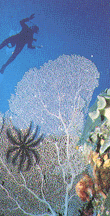

Pack spare bulbs, O-rings, straps too. Spares for photographic equipment is especially important.
Also pack your gloves and a dive suit. A 3-mm suit is recommended, both against hydroid stings and the chill thermoclines you may encounter. Upwellings can mean very cold water. If you expect to dive where they are, you will need something heavier than a 3-mm suit.
Although largely stamped out, it is recommended that you guard against malaria if you are going to Nusa Tenggara, Kupang and Roti, or Irian Jaya. If you are pregnant, it is safer to avoid Nusa Tenggara altogether.
Do not neglect minor cuts and scratches in the tropics. Disinfect and treat any broken skin.
Beware of the tropical sun, especially on long, cool boat rides in the open. Always use a hat, a long-sleeved shirt, long pants, and a sunscreen. If you must tan, do it gradually.
Drink plenty of fluids to avoid dehydration, and salt to replace that lost by perspiration. Drink only bottled water, which is widely available and safe, and avoid ice.
Pack a basic first-aid kit. Include vinegar for hydroid stings, tweezers to remove wooden boat slivers and sea urchin spines, oral rehydration salts, insect repellent and a salve to soothe insect bites. Should you need a doctor, alert your dive operator immediately, then your Consulate or Embassy.
For dive emergencies requiring decompression, you may need to be prepared to go to Singapore or Australia, although a number of decompression chambers are installed with the Indonesian Navy. It is recommended therefore that you establish emergency evacuation procedures with your dive operator before diving in any particular area.
[.Home.] [.Hotels.] [.Food.] [.Money.] [.Events.] [.Resources.] [.Jakarta.] [.Industry.]